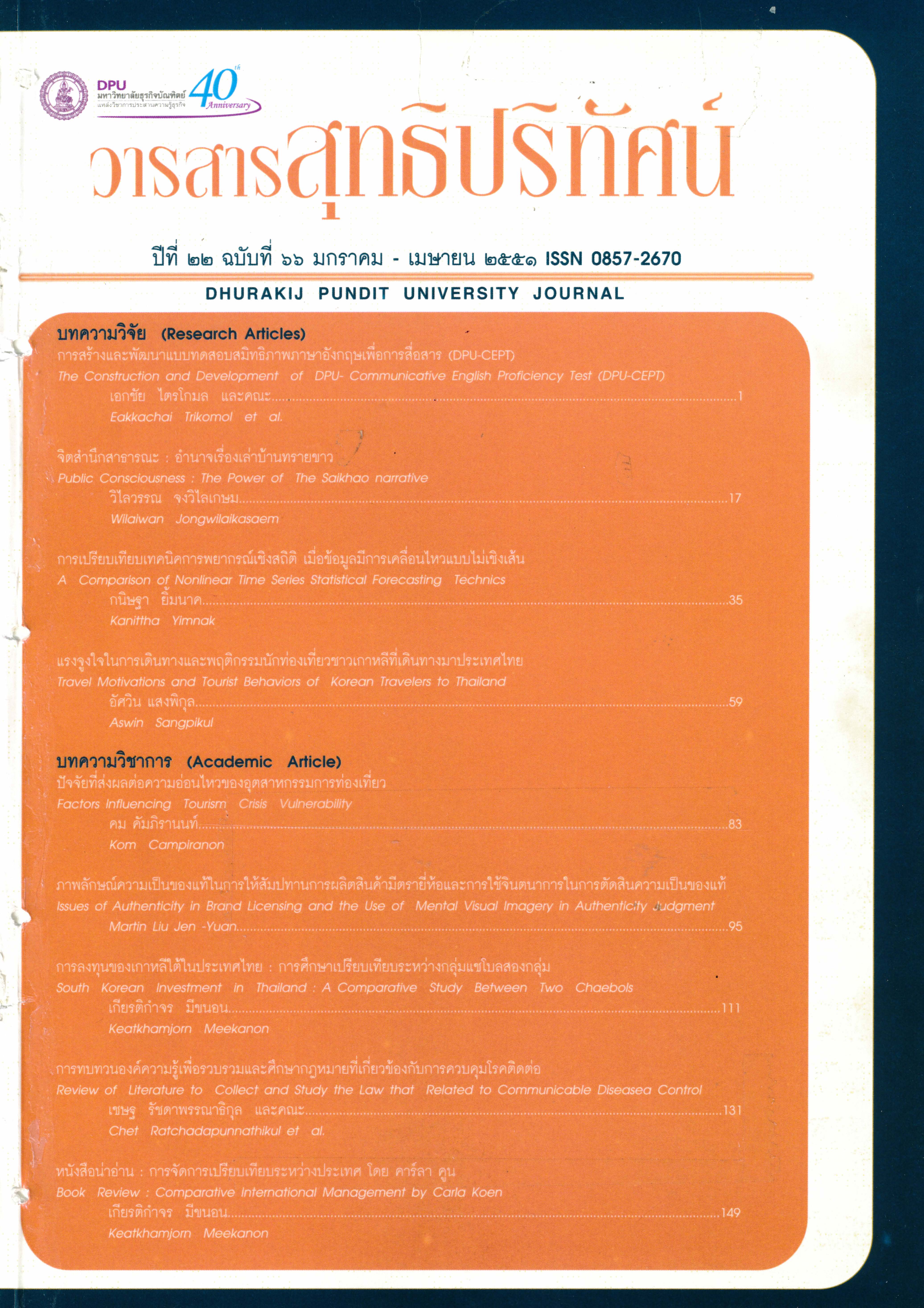แรงจูงใจในการเดินทางและพฤติกรรมนักท่องเที่ยวขาวเกาหลีที่เดินทางมาประเทศไทย
คำสำคัญ:
Travel motivations, Tourist behaviors, Korean travelers, Thailandบทคัดย่อ
นักท่องเที่ยวชาวเกาหลีไต้เป็นกลุ่มนักท่องเที่ยวที่สำคัญกลุ่มหนึ่งสำหรับหลายประเทศในเอเชียตะวันออกเฉียงไต้ ทั้งนี้เนื่องจากภาวะเศรฐกิจของประเทศที่มั่นคงและการขยายต้วของกลุ่มประชากรที่มีรายได้ปานกลาง ส่งผลให้ประชาชนกลุ่มนี้ นิยมเดินทางไปท่องเที่ยวต่างประเทศ อย่างไรก็ตามที่ผ่านมานักวิจัยไทยยังได้ไม่มีการศึกษาเกี่ยวกับนักท่องเที่ยวชาวเกาหลีเท่าที่ควร หากหน่วยงานที่เกี่ยวข้องต้องการ ส่งเสริมจำนวนนักท่องเที่ยวชาวเกาหลีไต้ให้มากขึ้น การศึกษาเรื่องพฤติกรรมที่เกี่ยวข้องกับการเดินทางของนักท่องเที่ยวกลุ่มนี้จึงเป็นสิ่งที่จำเป็นสำหรับการวงแผนการตลาดให้เหมาะสมกับความต้องการของนักท่องเที่ยวกลุ่มเป้าหมาย ดังนั้น งานวิจัยในครั้งนี้จึงมีวัตถุประสงค์เพื่อศึกษาแรงจูงใจในการเดินทางและพฤติกรรมนักท่องเที่ยวชาวเกาหลีโดยใช้ทฤษฎีแรงจูงใจผลักดันและดึงดูดเป็นกรอบแนวคิดในการวิจัย
งานวิจัยในครั้งนี้ใช้แบบสอบถามในการเก็บข้อมูลกลุ่มตัวอย่างนักท่องเที่ยวชาวเกาหลีจำนวน 40 คน โดยผลการวิจัยระบุว่าแรงจูงใจผลักดันที่ทำให้กลุ่มตัวอย่างต้องการเดินทางท่องเที่ยวได้แก่ "ความชอบสนุกสนามและการพักผ่อน" "การชอบค้นหาประสบการณ์ใหม่" และ "การชอบเข้าสังคมพบปะผู้คน" ส่วนปัจจัยดึงดูด ให้กลุ่มตัวอย่างเดินทางท่องเที่ยวมายังประเทศไทยได้แก่ "ความหลากหลายของทรัพยากรการท่องเที่ยวและปัจจัยค้นราคา" และ "ความปลอลภัยและความสะอาล แต่อย่างไก็ตมหกวิคราะหในชิสถิติพบว่ แรจูงใจหลักที่แท้จริงในการเดินทางท่องเที่ยวคือ "ความชอบสนุกสนานและการพักผ่อน" ส่วนปัจจัยดึงดูดที่สำคัญของประเทศไทยสำหรับกลุ่มตัวอย่างคือ "ความหลากหลายของทรัพยากรการท่องเที่ยว และปัจจัยด้านราคา" งานวิจัยในครั้งนี้ได้ค้นพบประเด็นที่น่าสนใจหลายประการที่เกี่ยวกับนักท่องเที่ยวชาวเกาหลี ทั้งนี้คาดว่าผลการวิจัยจะมีประโยชน์ต่อหน่วยงาน ที่เกี่ยวข้องโดยสามารถนำผลการวิจัยและข้อเสนอแนะไปพัฒนาและปรับแผน กลยุทธ์การตลาดและสินค้าให้เหมาะสมกับกลุ่มตลาดเป้าหมาย
เอกสารอ้างอิง
Cavana, R, Delahaye, B., and Sekaran, U. (2001). Applied Business Research: Qualitative and Quantitative Methods. Australia, Milton: John Wiley & Sons.
Chen, J and Hsu, C.(2000). "Measurement of Korean Tourists' Perceived Images of Overseas Destinations". Journal of Travel Research. 3S, 411-416.
Crompton, J.L. (1979). "Motivations for Pleasure Vacation". Annals of Tourism Research. 6(4), 408-424.
Cummings, J.(2000). Lonely Planet World Food Thailand. Melbourne: Lonely Planet Publications.
Danaher, P and Arweiler, N. (1996). "Customer Satisfaction in the Tourist Industry: A Case Study of Visitors to New Zealand". Journal of Travel Research. 35, 69-93.
Dann, G. (1977). " Anomie, Ego- Enhancement and Tourism". Annals of Tourism 4(4),184-194.
Hanqin, Z. O. and Lam, T. (1999). "An Analysis of Mainland Chinese visitors' Motivation Visit Hong Kong". Tourism Management. 20(4), 58
Heung, V. and Cheng, E. (2000). " Assessing Touris ts' Satisfaction with Shopping in the Hong Kong Special Administrative Region of China". Journal of Travel Research. 38, 396-404.
Huh, J, and Uysal, M. (2003). " Satisfaction with Cultural/Heritage Sites: Virginia Historic Triangle". Journal of Quality Assurance in Hospitality & Tourism. 4(3/4), 177-194.
Jang, S. and Wu, C. (2006). "Seniors Travel Motivation and the Influential Factors: An Examination of Taiwanese Senior". Tourism Management, 27(2), 306-316.
Jang, S. and Cai, L. (2001). "Travel Motivations and Destination Choice: A Study of British Outbound market'. Journal of Travel & Tourism Marketing, 13( 3), 111-133
Kim, E. Y. J. (1997). "Korean Outbound Tourism: Pre-visit expectation of Journal of Travel & Tourism Marketing. 6(1), 11-19.
Kim, S. M. and Prideaux, B. (1998). "Korean Inbound Tourism to Australia of Supply-side Deficiencies". Journal of Vacation Marketing. 5(1), 66-81.
Klenosky, D. 2002, "The Pull of Tourism Destinations: A Means-End Investigation", Journal of Travel Research. 40(4), 385-395.
Kozak, M. (2002). "Comparative Analysis of Tourist Motivations by Nationality and Destinations", Tourism Management, 23(2), 221-232.
Master, H. and Prideaux, B. (2000). "Culture and Vacation Satisfaction: A Study of Taiwanese Tourist in South East Queensland". Tourism Management. 21, 445-449.
Ministry of Tourism and Sports. (2008). "The Meeting of ASEAN NTOs + 3 (China, Japan and Korea)". [Online]. Retrieved. www.mots.go.th/ tourism/becon trol/files/tourism/document/9otbinlhih.doc (August 11, 2008)
Lam, T. and Hsu, C. (2004). "Theory of Planned Behavior Potential Travelers from China". Journal of Hospitality & Tourism Research. 28(4), 463-482.
Laksanakan, N.(2003). Travel Characteristics of International Visitors to Phuket. Unpublished Master thesis. National Institute of Development Administration, Bangkok.
Lee, C.K. (2000). "A Comparative Study of Caucasian and Asian Visitors to a Cultural Expo in an Asian Setting", Tourism Management. 21(3), 169-176.
Patterson, C. (2002). The Business of Ecotourism. Rhinelander, Wisconsin: Explorers' Guide Publishing.
Pearce, P. and Caltabiano, M. (1983). 'Inferring Travel Motivation from Travelers Experience".Journal of Travel Research. 12(2),16-20.
Sangpikul, A. (2007). Princples of Tourism Marketing. Bangkok: Dhurakij Punit University Press.
Sansartji, R. (2005). Atitudes and Behaviors of Traveling in Thailand of Foreign tourists after the Tsunami Disaster. Unpublished Master thesis. Thammasart University, Bangkok.
Sirakaya, E. and McLellan, R. (1997). " Factors Affecting Vacation Destinational of College Students". Anatolia: An International Journal of Tourism and Hospitality Research. 8(3), 31-44.
Taworn, R. (2007). Tourist Behaviors in Selecting Accommodation in Chiang Mai. Unpublished Master thesis. Chiang Mai University, Chiang Mai.
Travel Counsellors. (2007). "Thailand Touted as Best Value for Money". [Online]. Retrieved: http://news.travelcounsellors.co.uk/Thailand_touted_ as_best_value_for_money_18156923.html (September 2, 2008)
Tourism Authority of Thailand or TAT. (2003). Operational Plans for Determining Tourism Products. Final Report by Core and Planning Development Co.,Ltd. Bangkok.
Tourism Authority of Thailand or TAT. (2008). "International Tourist Arrivals by Country of Residence". [Online]. Retrieved http:// www2.tat.or.th/stat/web/static _download.php? Rpt-cre (August 1l, 2008)
You, X. and O'Leary J. (1999). "'Destination Behavior of Older UK Travelers", Tourism Recreation Research, 24(1), 23-34.
You, X., O'Leary, J., Morrison, A, and Hong, G. (2000). "A Cross-Cultural Comparison of Travel Push and Pull Factors: UK vs. Japan", International Journal of Hospitality & Tourism Administration. 5(1), 1-26.
You, X, O'Leary, J, and Lee, G. (2001). "Mature International Travelers: An Examination of Gender and Benefits". Journal of Hospitality & Leisure Marketing, 9(1/2). 53-72.
Yoon, Y. and Uysal, M. (2005). "'An Examination of the Effects of Motivational and Satisfaction on Destination Loyalty: A Structural Model". Tourism Management 26, 45-56.
Yenkuntauch, K and Lougepanitpitak, P. (2004). A Study of Tourist Behaviors in Chiang Mai. Unpublished Research Report. Rajamangala University of Technology Lanna Chiang Mai, Chiang Mai.
Yuan, S. amd McDonald, C. (1990). "Motivational Determinants of International Pleasure Time". Journal of Travel Research. 24(2), 42-44.
ดาวน์โหลด
เผยแพร่แล้ว
รูปแบบการอ้างอิง
ฉบับ
ประเภทบทความ
สัญญาอนุญาต
เนื้อหาและข้อมูลในบทความที่ลงตีพิมพ์ในวารสารสุทธิปริทัศน์ ถือเป็นข้อคิดเห็นและความรับผิดชอบของผู้เขียนบทความโดยตรงซึ่งกองบรรณาธิการวารสาร ไม่จำเป็นต้องเห็นด้วย หรือร่วมรับผิดชอบใด ๆ
บทความ ข้อมูล เนื้อหา รูปภาพ ฯลฯ ที่ได้รับการตีพิมพ์ในวารสารสุทธิปริทัศน์ ถือเป็นลิขสิทธิ์ของวารสารสุทธิปริทัศน์หากบุคคลหรือหน่วยงานใดต้องการนำทั้งหมดหรือส่วนหนึ่งส่วนใดไปเผยแพร่ต่อหรือเพื่อกระทำการใด ๆ จะต้องได้รับอนุญาตเป็นลายลักษณ์อักษรจากวารสารสุทธิปริทัศน์ก่อนเท่านั้น







